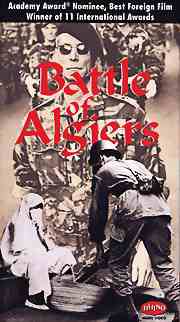Home > The Battle of Algiers

by Jenny Haines
The Battle of Algiers is a moving film about the national independence revolt
in the 1950s and early 1960s in Algeria, in particular the urban revolt in
Algiers in the Arab Quarter, the Casbah. The film was shot on 35mm film and
has been digitally remastered for current release. The black-and-white film
emphasises the dramatic action and the grainy quality illustrates with traumatising
clarity the grinding poverty of the Casbah. The movie maker has a fascination
with faces. The close-ups of the faces of the actors give a feeling of sympathy
and intimacy with those organising and participating in the revolt, and disdain
for those opposing it.
Whoever thought to remaster and release this film in the current times is a
genius. It is of great relevance to current events. The central questions for
anyone watching this film are: what is the best way to proceed when trying
to achieve social change by revolution – terrorism by the bombing of civilians
in shopping centres and nightclubs, or the organisation of the masses in civil
and military revolt? Can terrorism ever be justified? How do you organise terrorist
cells effectively? When does terrorism become a military revolt? How do you
stage a military revolt with only the most basic of resources? When does the
uprising of the civilian masses supersede terrorism and military action?
These are the questions the leaders of The Organisation struggle with in the film. They start with revulsion at the arrogance and racism of the French colonial administration. Their initial acts are to shoot and bomb French police, then they move on to bombing civilians. When the French colonials become terrorised by these tactics they bring in the French paratroopers, led by the very tall and striking figure of Colonel Mathieu. He was a fighter for the French Resistance against the Nazis, and sees himself as something of an intellectual soldier.
When asked by reporters about Jean Paul Sartre, he says he likes Sartre, but wonders why all the Sartres of the world are on the other side of the argument to himself. Nevertheless, he is a practical soldier with a job to do, and he goes about the job with meticulous and ruthless thoroughness.
So do his troops. He spurns the word torture, preferring to call his men methodical but the methods that they use would be called torture today, even by the leaders of the Abu Graib prison in Iraq. Mathieu suceeds in wiping out the leaders of The Organisation one by one, but in 1960, two years after the death of the last leader of the urban Organisation, a civil revolt breaks out in the Casbah, to the surprise of the French, but not Mathieu, who predicted it.
The sound of the Arab masses ullulating from the Casbah during the civil revolt senders shivers of pride down the spine at the power of the masses when organised and ready. The civil revolt is proof of the old saying that there is no more powerful idea than an idea whose time has come. Eventually independence for Algeria from the French in comes in 1962.
Colonel Mathieu is a curious figure because he could be standing in the current day talking about Iraq. He tells his commanders very clearly that the revolution in Algeria will continue whilever the French remain there. If the French want to stay, dealing with revolt is the price of staying. George Bush should be made to watch this film over and over, but he probably would not understand it. Maybe Michael Moore’s Farenheit 9/11 will do it for George!
This film is a must-see for anyone who considers themselves left-wing. Peter Thompson, the Channel 9 film critic said it’s "more than just a film. It’s an important document in the history of ideas that have shaped our world ... It’s a knockout." He’s right.
Now showing at the Chauvel and the Valhalla in Sydney.
Comments welcome. ozleft@yahoo.com.au
14.06.2004
Bellaciao Collective




